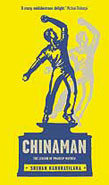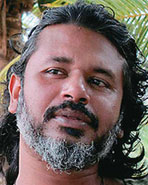If the Great American Novel, as Philip Roth argued, has to be about the Great American Sport of baseball—a conceit Roth himself put to use in a largely unsuccessful work with that title—then it is entirely plausible that the great Sri Lankan novel has to be about cricket. Few sports consume a country as cricket consumes Sri Lanka, and few activities transcend the ethnic, social and linguistic divides in that nation as this great sport does. Given the premise, it is entirely possible that the Great Sri Lankan Novel has been written—and that this wonderful book is it.
Of course, I have not read enough Sri Lankan fiction to substantiate such a claim. Nevertheless, Shehan Karunatilaka’s extraordinary first novel is manifestly a work of genius—one that manages to be about Sri Lanka without being overtly about it, and seems to be about cricket but goes well beyond it. His story is about an embittered, dying alcoholic sportswriter, W.G. Karunasena, obsessed with unearthing the mystery of the disappearance—from Sri Lanka and from the record books—of a brilliant cricketer, part-Tamil, part-Sinhala, who might just be the greatest bowler who ever lived.
 |
 |
Much of Sri Lankan literature in recent years has dealt with weightier issues—the brutal, generation-long civil war, the tragedy of the tsunami, the drama of poverty and development, and of course the perennial racial divisions that have torn this beautiful country apart. Chinaman barely mentions these issues. Race comes in because any novel about Sri Lanka cannot avoid it, and an amiable Tamil thug crops up from time to time, but the violence of the civil war occurs offstage. Instead, the real drama is about “W.G.” himself, his relationship with his long-suffering wife and neglected guitar-playing son, his friends Johnny and Ari, and above all his quest for Pradeep Sivanathan Mathew, the temperamental cricketing genius whose very existence has seemingly been erased.
Karunatilaka’s writing is astonishingly assured for a debutant novelist, witty, insightful, often clever and occasionally profound. His style is quirky and original: the novel unfolds in short sections with whimsical sub-headings, and is sprinkled with sketches, lists, wry observations and over-exposed photographs. And yet the idiosyncrasies never grate; they inveigle you into the mood of the book, so that, despite its slow unfolding at considerable length, Chinaman is not a novel you are ever in a hurry to finish. And when you do, it leaves a long, lingering taste in your mind.
The title refers simultaneously to one of Pradeep Mathew’s deliveries (not necessarily his most unplayable one, which has to be the “double-bounce ball” lovingly described three times in the novel) and to the Sinhalese expression, “konde bandapu cheena”, which according to the author means “pony-tailed Chinaman”, a synonym for a gullible person. “Is this a story about a pony-tailed Chinaman bowler?” Karunatilaka asks. “Or a tale to tell a pony-tailed Chinaman? That is for you to decide.”
As a reader, I became a bit of a pony-tailed Chinaman: so completely was I taken in by the author’s meticulously compiled, exhilaratingly invented and libellously transcreated cricketing lore that I found myself wanting to believe that Pradeep Mathew really existed. There can be few greater tributes to a fiction writer’s skills.
Of course, my own obsession with cricket helped sustain my interest throughout. “If you’ve never seen a cricket match; if you have and it has made you snore; if you can’t understand why anyone would watch, let alone obsess over what is essentially a cross between golf and a coconut shy, then this is the book for you,” the author writes early in his narrative. I couldn’t agree; without some knowledge of the sport, many of the book’s most rewarding moments would be unintelligible.
“Left-arm spinners cannot unclog your drains, teach your children or cure you of disease. But once in a while the very best of them will bowl a ball that will bring an entire nation to its feet. And while there may be no practical use in that, there is most certainly value.” He puts it even better towards the end of the book: “Unlike life, sport matters”.
Indeed, it does: that is one of this brilliant novel’s most valuable lessons. So also does good writing, an empathy for human failings and a rare talent for being able to dwell in another’s heart. Shehan Karunatilaka has it all. Long may his talent flourish. It will be a while before a Sri Lankan writes a better novel than this one.
Outlook --
(Diplomat turned politician, Shashi Tharoor has written many books including ‘The Great Indian Novel’) |



